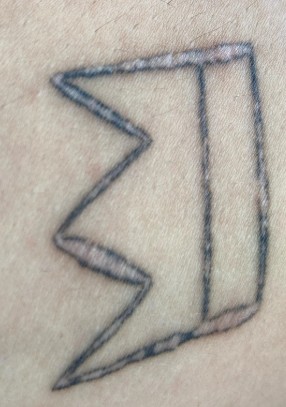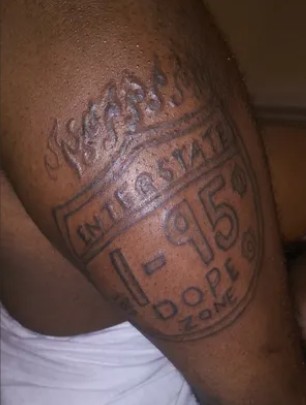Why Do Tattoos Sometimes Raise or Itch? A Fun Dive into the World of Inked Skin
- Simone Smith

- Feb 6
- 4 min read
Ah, tattoos. They are the art that you carry with you forever, the stories etched on your skin, the colorful declarations of identity. Yet, sometimes, these beautiful pieces of art can turn into a source of irritation—literally. If you’ve ever found yourself scratching at your tattoos or noticed them raising like a topographic map, you’re not alone. Let's dive into the mysterious world of itchy, raised tattoos and uncover why this happens.

The New Tattoo Itch
After you’ve endured the buzzing needle and admired your fresh ink in the mirror, the healing process begins. During the first few days, it’s perfectly normal to experience some itching. This itching is your body’s way of healing itself. When you get a tattoo, the needle punctures your skin, depositing ink into the dermis layer. This process creates a wound, and as with any wound, your body responds by sending white blood cells to the area to fend off infection and begin the healing process. This immune response can cause inflammation and, yes, itching.
As your tattoo heals, it will form scabs. These scabs are a protective layer, but as they dry out and fall off, the skin underneath can feel itchy. Think of it like a healing sunburn; it’s annoying, but it’s part of the process. During this time, resist the urge to scratch. Instead, keep your tattoo moisturized and follow your tattoo artist’s aftercare instructions to ensure the best healing experience.
Old Tattoos, New Problems
But what about those tattoos you’ve had for years? Why do they sometimes itch or raise seemingly out of nowhere? Several factors can contribute to this mysterious occurrence.
Allergies
Sometimes, the ink used in tattoos can cause allergic reactions, even years after you’ve been inked. Red ink is notorious for causing allergic reactions. If you notice that your tattoo itches or raises after exposure to certain substances or during specific times of the year, you might be dealing with an allergy. A visit to a dermatologist can help determine if this is the case and provide you with solutions.
Environmental Factors
Your surroundings can play a significant role in how your tattoo behaves over time. Allergic reactions can be triggered by various environmental factors such as pollen, pet dander, or certain chemicals. When your body encounters an allergen, it may mistakenly associate it with the foreign ink particles in your skin, resulting in an immune response targeting the tattooed area. This can cause itching, redness, or even swelling, making it seem as though your tattoo is the culprit. Take some Benadryl (antihistamine) you’ll be fine.
Weather and Temperature Changes
Just like your mood can be affected by the weather, so can your tattoo. Changes in temperature and humidity can cause your skin to react, leading to an itchy or raised tattoo. For example, in hot and humid weather, your skin might swell slightly, causing your tattoo to feel raised. Conversely, cold weather can dry out your skin, leading to itchiness.
Skin Conditions
Certain skin conditions, such as eczema or psoriasis, can affect tattooed skin. If you have a history of these conditions, you might notice flare-ups in your tattoos. Treating the underlying skin condition often alleviates the symptoms affecting your tattoo.
Hormonal Changes During Pregnancy
Pregnancy brings about significant hormonal fluctuations that can impact your skin in various ways. These changes can sometimes cause your tattoos to raise and itch unexpectedly. The increase in hormones like estrogen and progesterone can lead to heightened sensitivity and changes in skin texture. This can make your tattoos more prone to irritation. Additionally, the stretching of the skin as your body grows to accommodate your baby can cause the tattooed areas to feel tight and itchy.
Scarring from Inexperienced Artists
Ah, the perils of trusting your skin canvas to an amateur! When you let an inexperienced tattoo artist wield their needle, you risk more than just an unsightly design. Improper technique can lead to keloid scarring, a raised, bumpy texture that’s a far cry from the sleek ink you envisioned. Keloids are like the drama queens of the scar world—always making a scene and refusing to fade into the background. Unlike allergies, these overzealous scars aren’t swayed by antihistamines. Your best bet? Prevention. Choose a skilled artist with a proven track record to keep those keloids at bay
What Can You Do?
If your tattoo is driving you crazy with itching or has raised unexpectedly, there are a few steps you can take to find relief.
Moisturize
Keeping your skin hydrated is crucial. Use a fragrance-free moisturizer to avoid further irritation. Hydrated skin is happy skin, and happy skin doesn’t itch as much!
Avoid Scratching
We know it’s tempting, but scratching can damage the tattoo and introduce bacteria, leading to infection. Instead, gently pat or tap the area if the itch becomes unbearable.
Stay Cool
If your tattoo is reacting to the heat, try to stay in cool environments and avoid excessive sweating. A cool compress can also provide temporary relief.
Consult a Professional
If the itching or raising persists, it’s best to consult your tattoo artist. They can provide insights specific to your situation and help you find the best course of action.
Embrace the Ink
Tattoos are a beautiful form of self-expression, but like all good things, they require care and attention. Understanding why your tattoos might raise or itch helps you take better care of your skin and keep your ink looking vibrant and feeling comfortable.
So, next time you find yourself scratching at your artwork, remember that it’s usually a normal part of your body’s response. With a little care and knowledge, you can keep both your skin and your tattoos in perfect harmony.












Comments